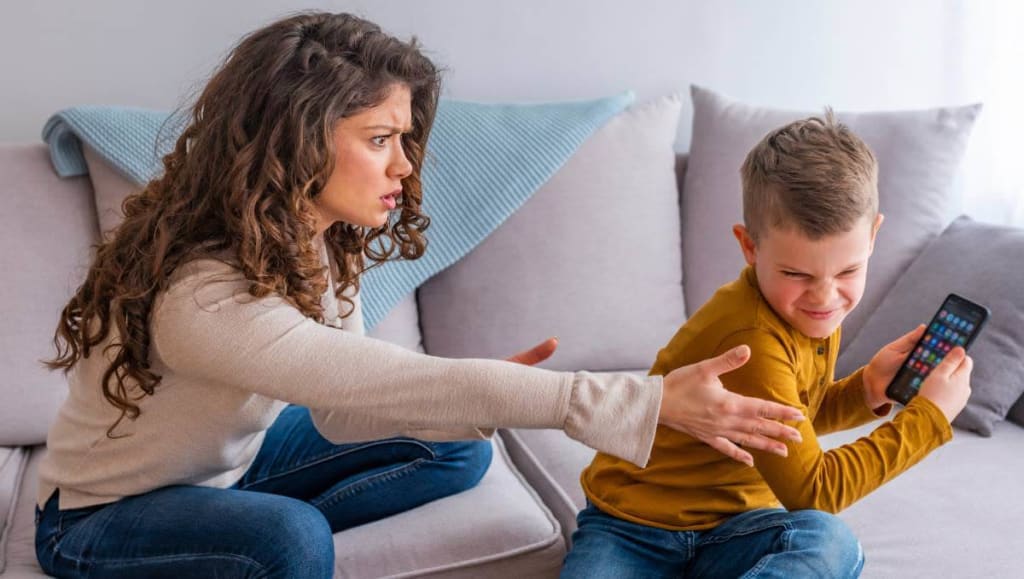Why Screen time for Kids Needs to be Controlled
How to create Screen Time Rules

Screen time it's a very common topic in today's world when you think of all the gadgets that have screens it makes sense why there would be some concerns TVs laptops tablets there are even screens in our cars, but does too much screen time really affect our kids
Controlling screen time can be tricky because screens are everywhere according to some health organizations we should probably be attention to the effects, screen time can have on our kids especially the little ones under the age of 5.
Early childhood is a period of rapid development and a time when a family's lifestyle patterns can be adapted to boost health gains So why should we adapt our lifestyle to reduce screen time when it comes to our kids,here are some reasons why.

Screen time means less green time
So the first reason is kind of a no-brainier but sitting in front of a screen means kids are not paying attention to the world around them Nature plays a big role in how we deal with everyday life. Have you ever felt stressed out, went for a walk along your favorite beach and instantly felt better it's like that . When little ones interact with nature it's been proven to help lower stress reduce aggression and can help them focus later on. This means the more time in front of the screen the less time they get to experience those natural mood enhancers and make good habits of playing outside.
As a matter of fact experts go on to say that screen time can do the exact opposite of what nature does when it comes to aggressive behavior and focus where nature calms and relaxes. Screen time can increase stress levels and create a feedback loop of depression. Not only that but when a child's ability to focus is thrown off they can't deal with the world around them properly. This might cause them to lash out more often. There have been studies that show screen time takes up a large amount of a child's mental energy. One fast and easy way of restoring that lost energy is to become angry, which will eventually turn into their way of coping with the suitation. Becoming angry will give them the boost of mental energy that they crave when they need it in other words you can expect more meltdowns more often.
Too much screen time can make kids sad
When kids are young their brains are still developing and studies tell us that the exposure to screens can and probably will have a negative effect. Mainly when it comes to video games. This targets kids who are most likely between the ages of 8 and 18 and have regular exposure to screens which is about 7 or so hours a day. The main side effects of too much screen time when it comes to addiction and gaming are reported as a motion processing, decision-making, cognitive control and the ability to focus one’s attention. Not only that but games flood the brain with the feel-good chemical known as dopamine. The problem with all the dopamine on a regular basis is that the reward pathways that accept this chemical and make us feel good get tired and worn out way faster than they should. This means that the kids affected will have to work a lot harder to feel happy. Not to mention dopamine helps with motivation and focus.

Screen time reduces dream time
We are sure at one point or another you've heard about how your phone, can be detrimental when it comes to sleeping. Especially if you're glued to Instagram right up until you go to bed. Well the same concept can be applied to the little ones too. just two hours on your device at full brightness can suppress the hormone that helps you fall asleep known as melatonin. Melatonin is what makes you feel sleepy and if you don't feel sleepy you're probably not going to fall asleep. Chronic disruption of your circadian rhythm your body's natural sleep and awake cycle can cause some pretty serious health concerns. The other problem is if this cycle is disrupted even if you do get to sleep, it won't be the deep rest of sleep that you need to feel refreshed the next day. We all know how kids can get when they're tired and who wants that to be the norm.
What can be done
So what can you do to help your family stay healthy in this giant tech world that we live in. Well for starters there are some guidelines. For infants that are less than a year of age you should be active throughout the day with things like play and tummy time when they're awake. They shouldn't be strapped into a seat when they're awake for longer than an hour each day. This means things like strollers high chairs or being strapped to someone. When the baby is still it's a good idea to read to them after all bedtime stories are the best.
This is pretty much the same for kids under the age of four, although they should be active for at least three hours a day. his includes things like playing running walking basically anything that gets them up and moving.
Kids who are between the ages of 2 and 4 need a bit less sleep than an infant. But those are what is recommended when it comes to activity and staying still.
So we know that little one shouldn't be still for more than an hour each day. When it comes to screen time kids tend to be pretty still. This leads us to believe the kid should have no more than an hour of screen time each day .
It's also recommended that besides things like video chatting to grandparents and friends, you should put in place some screen time rules. For infants under the age of 24 months it's recommended that they don't get any screen time besides video calls like we just mentioned.
For kids ages 2 to 5 an hour of screen time a day is plenty. You should also monitor what your kids are looking at and make sure the things they're watching are age-appropriate and are more on the educational side of things and stuff that limits the amount of advertising .
Everyone's household is different and really, it's up to you to decide what works and what doesn't. The above are just facts, you can build your schedule around that. We live in a digital era and understanding what they see on screen isn't always true or real is extremely important. This is called digital literacy and it's basically critical thinking when applied to the Internet. This is directed at kids who are a little older but they’ll probably ask questions and you want to make sure that you have the proper tools to understand what they're seeing. Remember there are lots of parental tools that you can use to help filter content you don't want your kids to see.
Have you ever taken some time to unplug? Lots of people have a day where they try not to use any technology, and some claim it works wonders for clearing the mind. When your kids get older scheduling a data unplug and spend time outs side or do something together might not be a bad idea. You can set phone curfews turn your TV off after a certain hour or install some apps that limit the amount of screen time available on a particular device. Again every household is different and it might take a little time to figure out what works for you and your family. Screens are everywhere and are part of our daily lives, but we should remember it should be in moderation.
Here are some tips for you to reduce your child's screen time while in the home.

Tip number one
Set the example starter to start with the toughest one but there's nowhere else to start. Children will always gravitate towards the model behavior of their parents. If they see you reading a book, they're more likely to read if they see you watching television so will they so. If you want your kids to stop staring at screens put the phone down.
Tip number Two
Treat screen time as a privilege that kids need to earn not a right that they're entitled to be sure to set up rules in the house where screen time is only allowed after chores are done and homework is completed just like any other toys or games.
Tip number Three
Encourage other activities if a child has nothing to do but stare at a screen then we should not be surprised when that's the only thing that he or she does. Be sure to provide necessary resources such as books to read, board games, art supplies, musical instruments, sporting equipment like bikes frisbees, skateboards. You know also play with your kids get down on the floor with your kids and pick up a truck a doll a board game. It takes in-tentionality and selfless love when they are 6 but when they turn 13 you'll be glad you did it
Tip number Four
Make computers and TVs stay in the shared spaces of your home. It's much easier to exercise control when your child is within view, so that means keeping video games and TV and computers all in the common areas like the living room the kitchen where you can keep an eye on things and watch the games as they play and keep track of the websites they're on.
Tip number Five
Set the family rules and stick to them. It's just like any other parenting skill you've got to set guidelines and set them early if your rule is that social media is OK from 6 to 7 p.m. or after homework is done or only on Monday Wednesdays and Fridays then be consistent. Consistency through the years is important. If you have really relaxed rules in your home for the first 6 years it makes it harder to implement the rules later. Also you can add Tech time to your family schedule at all ages your kids should know that there are specific times where screens stay off like a meals or before bed you might set aside time every week when the family does something fun together no device is allowed
Tip number six
Storytelling is an older and lost art form and a good storyteller can pull a child into the tale while letting him use his imagination, because not every picture is drawn for him. The act of listening to a story builds listening skills and trains a child to concentrate and give his undivided attention. So many children are growing up today multitasking them on many different media that they lose the ability to focus on one task at a time if any of you tell bedtime stories to your children you'll know the power of stories. So use story tapes or CDs or mp3s during daytime hours to entertain your kids.
Tip number seven
Make the tech work for you. Use parental controls and apps that you can set to turn off computers, tablets, smart phones after a given amount of time. Find some way to monitor and filter, what can come through each screen in the house. I've just discovered a few apps that have some free features, as well as paid features. They allow you to set daily screen time limits, approve apps before installing them and allow other care givers to control screen time. They are screen time parental control apps and each have a free and paid version costing forty dollars and twenty four dollars per year respectively.
About the Creator
Kingsley Fisher
Freelance content writer and blogger with a lot of stories and thoughts in my dreams.What ever it be I look forward to sharing those stories and thoughts with you.





Comments
There are no comments for this story
Be the first to respond and start the conversation.